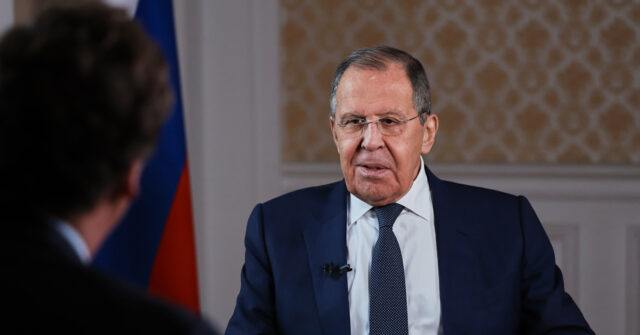Russian Foreign Minister Sergei Lavrov recently communicated the Kremlin’s stance during an interview with broadcaster Tucker Carlson, emphasizing that while Russia does not regard itself as being at war with the United States, it expects its warnings to be taken seriously. He characterized the current relationship between the two nations as falling into a “dangerous situation,” with Russia prepared to utilize “all means” necessary for its defense. This assertion came amid Lavrov’s frustrations regarding his inability to engage with Ukrainian leaders, which he views as crucial for presenting a comprehensive narrative. He claimed that despite Moscow’s desire to avoid nuclear confrontation, it must respond firmly against perceived threats from the West.
Lavrov’s statement that Russia does not see itself at war with the U.S. can be interpreted as a strategic move to de-escalate tensions, likely aimed at West leaders who may welcome a diplomatic approach. Despite this seemingly conciliatory tone, he issued strong warnings, particularly regarding Western military support for Ukraine. He indicated that continued supply of long-range weapons from the U.S. and its allies to Ukraine could provoke a more aggressive reaction from Russia, stating that they would “not allow” such initiatives to lead to what is termed a “strategic defeat of Russia.” Lavrov’s comments reflect a dual strategy of seeking dialogue while also maintaining an assertive posture against military assistance to Ukraine.
Significantly, Lavrov referred to Russia’s recent missile launch as a demonstration of its willingness to use all necessary means to protect national interests. He framed this action as a warning against Western interference, suggesting that more such actions could follow if warnings were unheeded. The repeated insistence on protecting Russia’s “legitimate interests” indicates a broader narrative designed to justify its military actions in Ukraine, as the Kremlin continues to deny aggression and instead presents itself as a defender of regional ethnic Russians.
Moreover, Lavrov’s comments also reiterated the Kremlin’s typical rhetoric around its military campaign in Ukraine being a “special military operation,” ostensibly aimed at safeguarding Russian-speaking populations. He reiterated that contemplating a nuclear exchange with the United States is a catastrophic thought, despite Russia’s frequent nuclear threats in recent years, particularly from influential figures such as former President Dmitry Medvedev. This juxtaposition of rejecting the notion of a nuclear war while simultaneously threatening its possibility highlights the inherent contradictions in the Russian leadership’s narrative.
Lavrov’s recent engagements on the international stage came during a significant turn of events, as he attended the OSCE conference in Malta, marking his first international trip to a Western country post the 2022 invasion of Ukraine. During this event, Lavrov placed blame on Western nations for exacerbating the conflict in Ukraine, framing it as a diversion from significant U.S. domestic failures, particularly referencing the chaotic withdrawal from Afghanistan. His rhetoric suggested a shifting of the geopolitical landscape back to a Cold War mentality, implying that the West has sought a new adversary following the fallout from Afghanistan.
In summary, the complexity of Lavrov’s statements reflects the dual strategy of negotiation and provocation adopted by the Russian government. While professing a desire to avoid outright conflict, the use of stark militaristic threats signals an unwillingness to back down in the face of Western support for Ukraine. As tensions remain high, Lavrov’s assertions underline a profound standoff, where both nations must navigate a precarious balance between diplomacy and military preparedness while each side interprets the other’s actions within the existing conflict framework.

